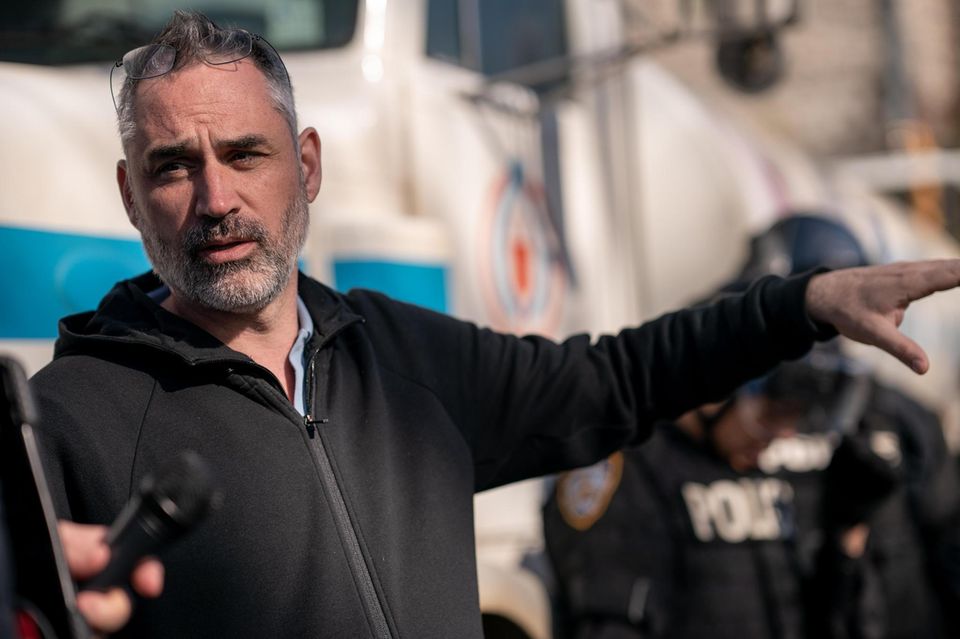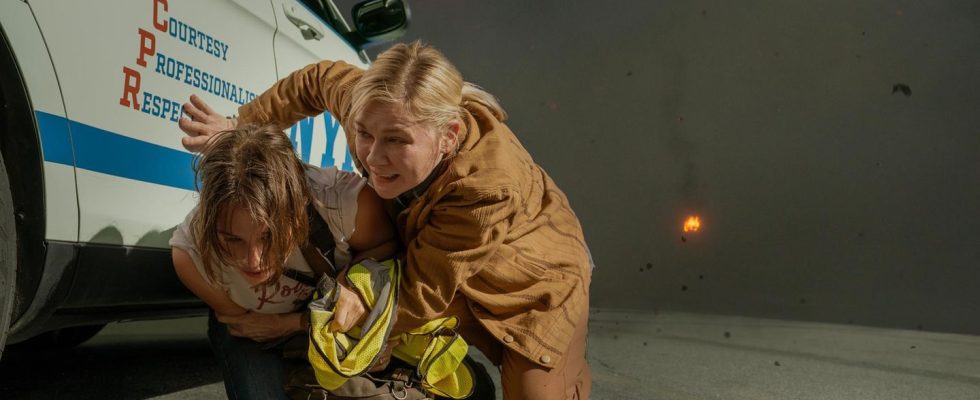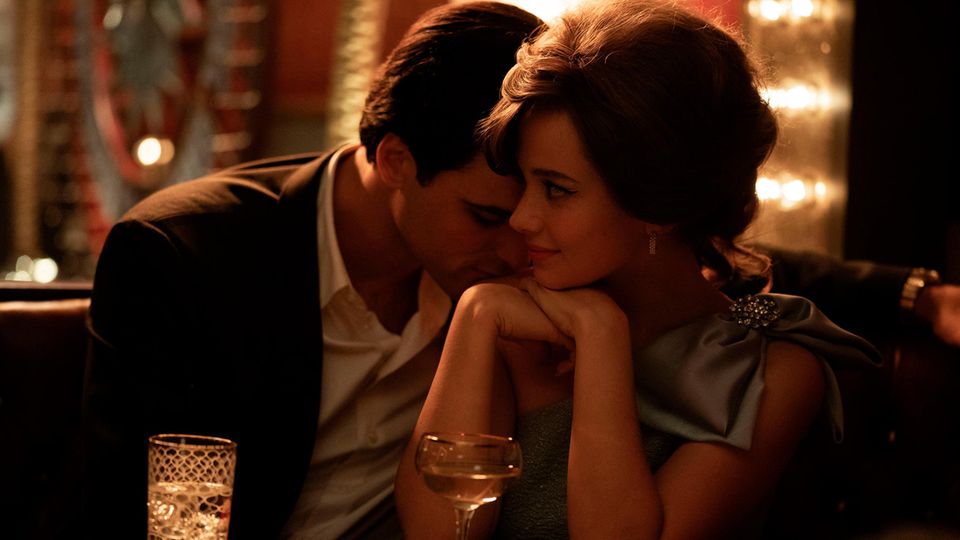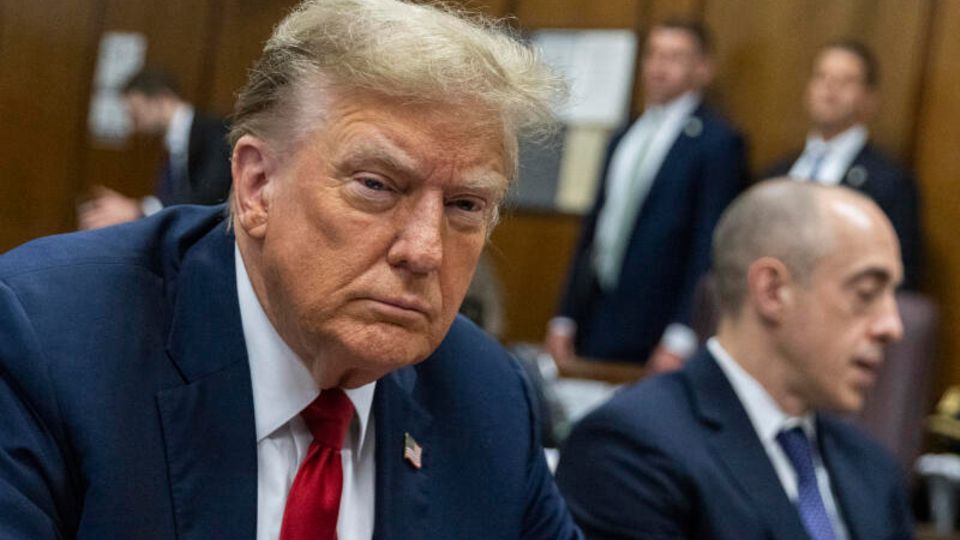Movie “Civil War”
An oppressively realistic civil war scenario in the USA
Bombshell story: Two photo reporters (Cailee Spaeny, left, Kirsten Dunst) look for cover
© DCM Film Distribution GmbH
The USA in the fight against itself: Director Alex Garland lets a civil war break out in “Civil War”. Is it smart to release the film in theaters at such a tense time?
Hardly any other author and filmmaker has recently looked into the future as accurately and intellectually brilliantly as Alex Garland. The “Hollywood Reporter” immediately ennobled the 53-year-old Brit as a “director of big ideas.” His first novel – the world bestseller “The Beach” from 1996, later made into a film with Leonardo DiCaprio – dealt with the destructive consequences of mass tourism. In science fiction works such as “Ex Machina” and the television series “Devs” he was concerned with the dangers of artificial intelligence: why it might not be a good idea to give too much power to technology companies. “We always hope that these geniuses make great decisions,” Garland says in the star-Interview. “In reality, they may only be acting in self-interested ways as entrepreneurs.”

A prophet: Garland filming “Civil War”
© Murray Close / Miller Avenue Productions LLC
“Civil War” is also about the consequences of too much power. For his most expensive film to date, the budget is said to be around $50 million, Garland dares to create a political vision that is oppressively close to reality.
The USA goes to war, for once not against archenemies such as Iran or North Korea, but against itself. When the president does not want to step down after two terms in office, changes the constitution and abolishes the FBI, 19 states break away from the former ones United States, including Florida. Even the usual political trench warfare will be overcome. While the fascist leader unleashes tanks and jet fighters on his citizens, Texas and California form an alliance.
Meanwhile, in the midst of the chaos of war, a group of photojournalists (played by Kirsten Dunst, Wagner Moura and newcomer Cailee Spaeny, who has just become known as “Priscilla”) are trying to get to Washington, DC, where they want to get one last interview from the domineering president. It would be a bombshell story.
Garland doesn’t mention Trump’s name
“I’m talking about something that hasn’t happened yet and hopefully will never happen,” says Garland in the interview, his reading glasses pushed up the whole time, as he did during filming. However, the source of the fear behind this is not fiction. “It exists. Not just for me, but for many people,” he says. He cites his own homeland, Great Britain, as an example. “My country has been incredibly divided by populist politics from bad guys like Boris Johnson.” Populist politics will sooner or later lead to extremism and an erosion of the separation of powers. This is currently happening in Europe and the Middle East, but only the USA is so big and influential that the effects would be colossal. “So it makes sense for me as a filmmaker to look there,” Garland says.
He conceived and wrote the story in 2020. Because of the pandemic and the actors’ strike, his civil war is only now breaking out in cinemas, a few months before the US election. A Republican is running who fed his supporters with conspiracy theories after his last defeat and incited them to storm the Capitol.
Garland doesn’t mention Trump’s name during the entire conversation. The similarities are just too obvious; As an artist, he prefers to light smokescreens and stimulate the audience’s thinking. “I couldn’t have predicted what was happening in the USA at the time,” he says.
A question that still needs to be asked: Is it smart to release the film in theaters at such a tense time? Critics accused him of using his actions to provide right-wing groups with a template for taking up arms. “I don’t know the answer to that,” Garland says. However, he finds it just as risky to force himself into silence. “Should you change your behavior, your thought processes based on the reaction of extremists? I think not.”
The heroes of “Civil War” are not soldiers, but journalists. Garland’s father Nicholas worked as a newspaper cartoonist, and Garland has admired foreign correspondents since he was a child. Why did he not become one himself? “I found writing true stories much more difficult than fiction,” he says.




